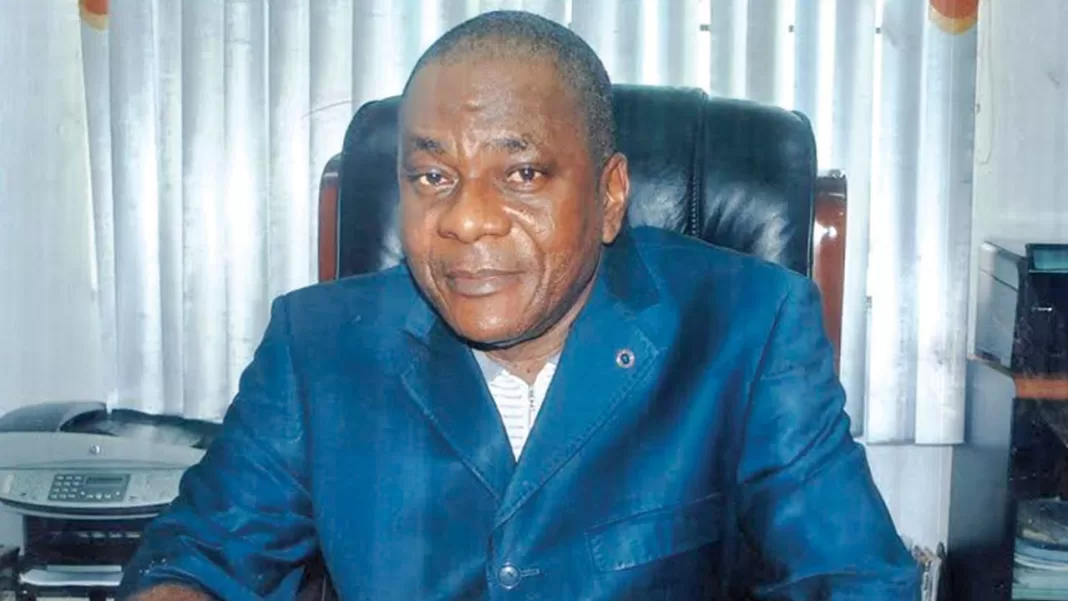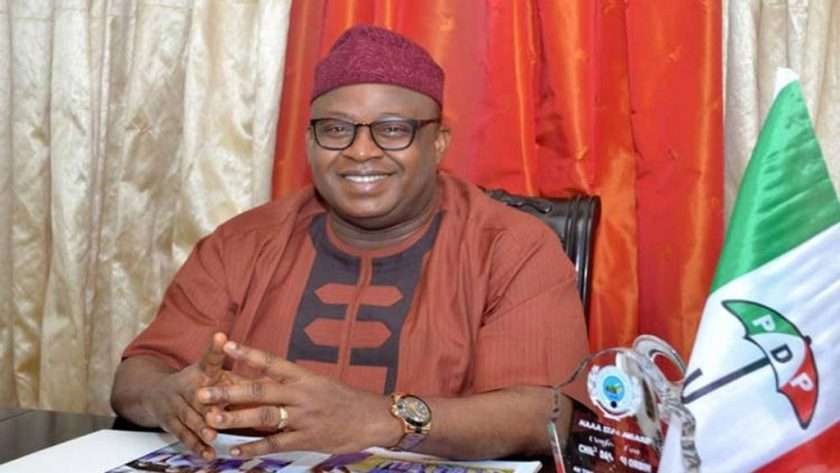By Lucky Amiwero
Your Excellency Sir, our Ports are associated with cumbersome, lengthy and unwholesome practice, which ranks our Ports as the most expensive within West African sub-region.
As an organization that has served in various Federal Government Committee, which includes: Presidential Task Force on the Reform of Nigeria Customs service, presidential Committee on 48hours clearance of goods from the port, Presidential Committee on Destination Inspection/Central Bank, Task force for the review of Port charges, levies, and dues , Import clearance procedure and the implementation of fiscal policy measures, Committee on FAL /Project 48, Consultant to the House committee on Custom and Excise, Consultant to the Ad Hoc Committee on the investigation of Ministry of Finance and Single window technology
Copies of the letters of appointment are attached and marked appendix 1 (a)(b)(c )(d)(e)(f)(g)(h)(i)(j)
We are more concerned about the process of privatizing Nigerian Ports without legal framework and economic Regulator, which has constituted hindrance, that resulted to: gridlock on our roads, no holding bays, No trailer parks, no Government warehouses in the Ports, No regulator to check the private monopoly of the Terminal Operators, these components where excluded from the Port privatization process
The Holding Bays that existed before 2005 within and around the Ports, was ceded out as land space to Terminal Operators, without providing alternatives, all the spaces used for various activity to enhance port activities, was ceded to Terminal Operators, forcing the Trucks, lorries to use the available Port access road to hold empty containers and wait as holding bay, awaiting access to the Port to load clients consignment.
There are no Government warehouse to place Government cargoes , No trailer Parks , no Economic Regulator, no holding bay, duplication of charges and charges not tied to service is prevalent in our Port System.
Nigeria Port System is expected to serve the economy and meet the needs of Port users in a manner, which is economically and environmentally sustainable, through the establishment of:
(i)An appropriate operational process
(ii)Efficient port procedure and
(iii)Effective legislative framework
THE GLOBAL OBJECTIVE OF PORT REFORM
The global objective of a Port reform is to achieve the following:
(a)To improve efficiency of operations and management of the Port
(b)To achieve reduction in cost of cargo clearance
(c) Improve service delivery
(d)Become more client friendly
(e)To facilitate further development of the Nations transport infrastructure
(f)To eliminate congestion and facilitate the emergence as a Hub and Transshipment center or preferred Port
(g)Generate wealth and create employment
(h)Reduce bureaucracy and
(i)Attract foreign direct investment
THE BUREAU OF PUBLIC ENTERPRISES (BPE) AND PORT PRIVITIZATION
When the BUREAU OF PUBLIC ENTERPRISES (BPE)
The(BPE) advertised for the concession of the Port in 2003, four critical issues was conversed by the Bureau to justify the need for the concession of the Port, which is highlighted as follows:
1To achieve reduction in cost of cargo clearance
2To improve efficiency of operation and management of the Port
3To facilitate further development of nations Transport Infrastructure
4To eliminate congestion and facilitate the emergence of Nigeria as a Hub for West African Sub-region
After nineteen (19) years in to the lease agreement Tagged concession, there is the need to ascertain, if the objective of the Port Privatization, deceitfully Tag concession has been realized, in line with objective of the Bureau of Public Enterprises (BPE) , putting in mind the provision of Section 7(c ) of the Port Act 38 of 1999.
The provision of Section 7-© of the Port Act clearly states:
Ensure the efficient management of port Operation, Optimal allocation and use of resources, diversification of sources of revenue and guaranteeing returns on its investment in order to contribute effectively to the well-being to Nigeria Society
Copy of Section 7-©of the NPA Act 38 of 1999 is attached and marked appendix 2
THE PRIVIATIZATION OF NIGERIAN PORTS IS BASED ON LEASE AGREEMENT, WITHOUT LEGAL FRAMEWORK AND PORT REGULATOR SINCE 2005 TILL DATE THE NEGATIVE EFFECT
The concession of Nigerian Ports in 2005/ 2006 excludes three critical components:
Proper legal framework to midwife the concession of Nigeria Ports ,
Port Economic Regulator to Monitor the operation, terms of the agreement and unwholesome practice by the Terminal Operators and shipping companies, there is no provision of concession in NPA Act 38 of 1999.
The privatization was based on lease agreement not concession, which only allow for only 5 years lease as contained in Section 25-(2) NPA act 38 of 1999
Copy of Section 25-(2) (NPA act 38 of 1999 is attached and marked appendix 3
The exclusion of the three (3) components: Legislative Framework, Commercial/Economic Port Regulator and concession, from the inception of the Port privatization process in 2005, created room for the present hindrance in our Port System, the principle of concession was jettison , there is no provision of Concession in Nigerian Ports Authority Act 38 of 1999, but only lease agreement for five(5) years, as contained in Section 25-(2)
The impediment makes our port one of the most expensive in the Globe, which gave the Terminal Operators and Shipping Companies advantage to manipulate and control the Ports System, that lead to bottleneck, Gridlock on port access roads, high cost of clearance and extreme private monopoly to the detriment of the economy.
Copy of the Lease agreements is attached and marked appendix 4
CONCESSION NOT PROVIDED FOR IN THE PRESENT NIGERIAN PORTS AUTHORITY ACT 38 OF 1999 ONLY LEASE FOR FIVE (5) YEARS
The Nigeria Ports Authority Act 38 of 1999 provides for private sector participation of the following:
FOR JOINT VENTURE:
Section 7-(f) Manage, supervise and control or take part in the management, supervision or control of any company or undertaking in which the Authority is interested by reason of shareholding or otherwise and for that purpose appoint and remunerate directors, accountants, other expert and agents
Corporatisation
Section 8-(f) Acquire any undertaking of any registered business that affords facilities for the loading, unloading or warehousing of any goods in any goods in any port in Nigeria;
Private Participation
Section 8-(i) enter into agreement with any person for the operation or the provisions of any of the port facilities which may be operated or provided by the Authority
Nigerian Ports Authority Act 38 of 1999, has no provision for Concession it only provide for lease of five(5) years, there is no such provision for build operate own and transfer BOO/BOT /BOOT in the Act, the lease was contracted out between BPE/NPA and Terminal operators on lease agreement from up 10-30 years, which is not backed by the NPA Act 38 of 1999
Copies of section 7-(f), 8-(f) and 8-(i) is attached and marked appendix 5
The Introduction of Destination Inspection Regime In 2006 Increases The Facilitation of Clearance And Increase In Throughput Of Cargo By Automation And Scanning
We as a body initiated the concept of Destination inspection in 2001 that was used to introduce Destination Inspection regime and became member in 2006, which was implemented that increased the cargo throughput and reduced the stay of ship and cargo in the Port system from 2006 to 2013
Copy of letter from the presidency Towards successful implementation for Destination regime is attached and marked appendix 6
The facilitation of the clearance of goods from the port and the increase of cargo throughput was as a result of the Introduction of Destination Inspection(DI) regime in 2006 through the acquisition of Scanners contracted between the Federal government of Nigeria and Some Service providers, Namely: Cotecna, SGS and Global Scan on a Build, Own, Operate and Transfer(BOOT) basis for the provision, installation, operation and management of X-Ray Scanning Equipment and software for examination of goods, for a period of seven years from 1st of January 2006 to 31st December 2012, which was finally extended for one additional year by the Federal Government.
The examination was done Under selective principle of examination High Risk , Red amber Light, /Med risk Documentary check,/Scanning, yellow amber light low risk green amber light release without examination and amber light release at importers warehouse
The automation was contracted with United Nations Conference of Trade and Development (UNCTAD) agreement for the provision of technical assistant for automated system for customs data with the Federal Government 28th of October 2005, with application software:
Tariff and control table Management,
National configuration management,
Declaration, including inward Transit and post entry,
Direct Trader Input (DTI),
Selectivity and Risk Management,
Examination officer control,
Warehousing,
Payment and cash accounting,
Manifest processing,
Temporary Admission,
ASYCUDA development plat form system security and declaration data for statistical and management information
The Federal Government entered into another contract agreement with WEBB FONTAINE CONSORTIUM on a Build, Own, Operate and Transfer(BOOT) for provision, Installation, Operation and Management of Information Technology and Telecommunications hardware and software, Tanning and power-supply equipment and associated Service for the implementation of ASYCUDA World in Nigeria made on the 28th October 2005 commenced 1st January 2006 for 7 years duration.
Copy of Scanning contracts Cotecna, SGS, and Globalscan , unctact compont on ASYCUDA+ + and WEBB FONTAINE face agreement is attached and marked appendix 7(a)(b)(c)(d)(e)(f)
The introduction of Scanning and the application of selective principle of examination of Risk Management Level High risk, Med Risk/Scanning and Low risk release without examination no risk, the automation of cargo clearance through electronically inter -face process, reduces 70% of delay experience in the clearance of goods by removing the 100% cargo examination which is laborious , disruptive, inconsistent, unpredictable and add to stay of ship and cargo in the port
The Lease agreement on the Port Reform created hindrance, bottleneck, Gridlock, Lack of holding bay, no Government Warehouse and trailer park, No legal framework no concession provision in the Port Act, no Port Regulator to regulate the Commercial and economic aspect of Port operation making our port the most expensive in the world.
The Proper Concept Of Port Reform/ Privatisation Based On World Bank And Global Application Of Port Concession
Nigerian Port privatization was designed after the Landlord Port model, which is suppose to be structured into three components (i)Landlord,(ii) port operation(iii) Port economic Regulator , with the ceding of the four element: (a) Traffic, (b) Tariff (c) Labor(d) infrastructure, which is not contained in NPA law, that resulted to the dismissal of close to 10,000 workers after the lease agreement without law.
As landlord, the Nigerian Port Authority (NPA) its not to be directly involved in Port operation, the Nigerian Port Authority is to act as a neutral landlord promoting the Port as a whole, with especially perform their marine function under the Landlord approach.
No Port Economic Regulator
The Government should have first embark on proper regulatory framework before the privatization process in 2005, a government that fails to get the structure and regulatory system right from the outset will face an immensely, costly, which will be hard, time-consuming and acrimonious process, to rectify matter will be very difficult, just as we are confronted with barrage of impediment for the past nineteen (19) years into the Privatization process in Nigerian Ports.
The main function of the Regulator is:
To exercise Economic Regulation of the Ports system,
To avoid private monopoly by correcting various market imperfection,
To promote equity of access to ports and to facilities and service,
To monitor the activities of the Authority to ensure that it meet up with its own function,
Promote efficiency,
Protection of consumer and users against monopolistic or other abuses by operators
Prevention of pricing or service discrimination,
The provision of adequate, affordable and efficient Port service and facilities,
Consider proposed tariffs,
The Regulator must hear appeals and complaints,
Regulator should have power to adjudicate dispute between Port operators and uses,
Protection of investors against unfair or unreasonable government action
No Concession Agreement In Nigeria Ports Authority Act
The primary objective of concession agreements is to transfer investment cost from government to the private sector, they are obliged to construct and rehabilitate infrastructure and operate a facility for fixed years based on the
Concession agreement
Concession agreement are often developed as a part of Build Operate and Transfer, it legally represent special agreement between the Government/Port Authority and the Terminal operators, who are to carry out construction and operation of a Port development project.
Under the concession agreement, the ownership of the affected assets, is retained by the Port Authority and the commercial risk of providing and operating the assets is transferred to the private concessionaire.
Copy of the lease agreement with terminal operators which is misconstrue as concession agreements is attached and marked appendix 8(a)(b)(c)(d)
The need To Set Up Committee Of Expert To Review The Process To Accommodate The Shortfall Inherent In The Port System
To address the hindrance and impediment in the port system which attract high clearance cost, bottleneck, inconsistency and charges not tied to service collected by various organization.
The lengthy and cumbersome process excludes Nigerian Port as A load center, preferred Port or transshipment Hub ,due to the complexities inherent in our Port system, which makes our port the most expensive in the globe.
The Federal Government should constitute committee of expert to review the shortfall inherent in the Port system , in other to reduce the cost of doing business , lengthy and cumbersome procedure and duplication of process and charges not tied to service, so as to attract back our cargo from neighboring port and foreign direct investment.
Amiwero, a major stakeholder writes from Lagos





